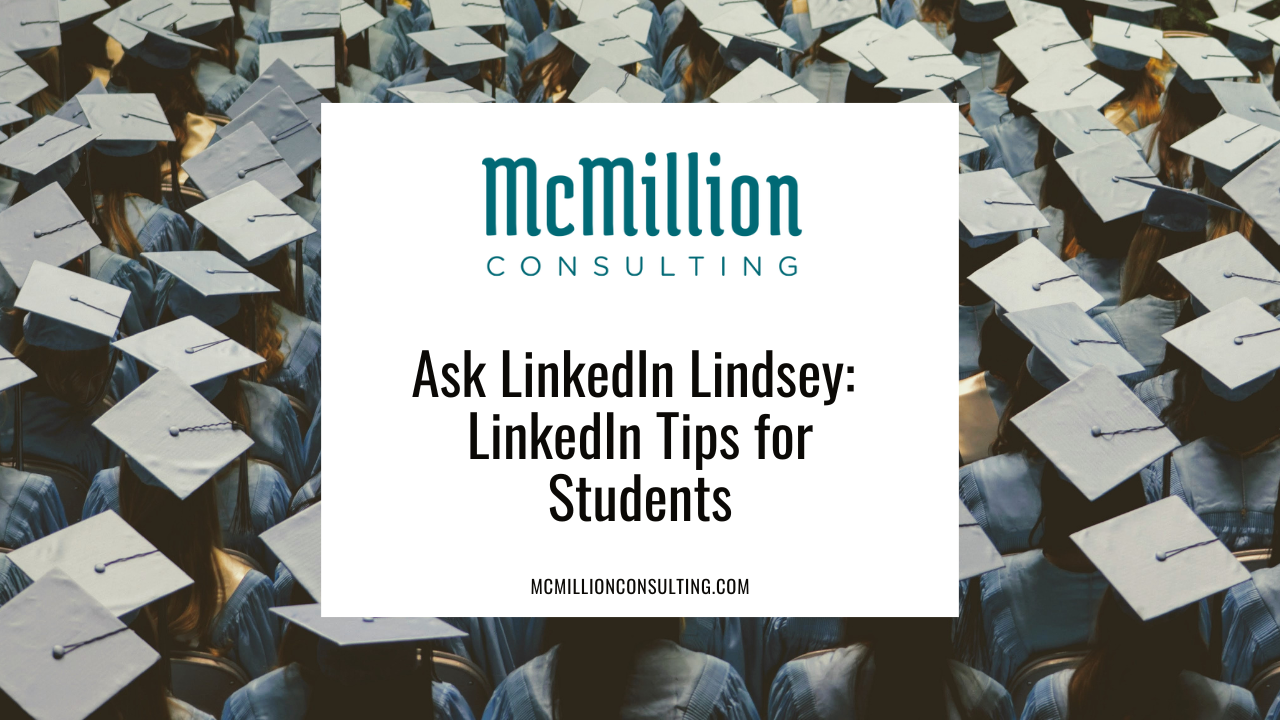Ask LinkedIn Lindsey: LinkedIn Tips for Students
Jul 05, 2022
Most of the clients I serve would only call themselves students in the sense that they’re lifelong learners. Still, I receive a surprising number of questions related to LinkedIn for students. In the spirit of helping my people help their people, I’ve decided to dedicate a full article to clearing up some of the most common sources of confusion about students and LinkedIn. Whether you’re a student yourself, you have a college-aged child, or you’re responsible for recruiting or training recent grads on your team, these tips are for you.
Q: How long should I keep student work experience on my profile?
A: It depends. There’s no hard-and-fast rule on this one. If your internships and school work experience are relevant to your personal career narrative, there’s no harm in keeping them on your LinkedIn profile. A particularly impressive or formative internship can be a great point of conversation with other professionals.
You might consider removing or excluding student work experience if it’s no longer relevant to what you do or want to do, it’s not significant to your story, you’ve held more than five post-school positions, or you have more than 25 years of work experience.
Q: How do I build my network?
A: This is a great question! And one I could spend pages answering. As a starting point, don’t neglect the power of your alumni networks. In my experience, alumni love connecting with and supporting people from their schools. I recommend joining both broad alumni groups, like “Clemson Alumni” as well as narrower groups, like “Clemson Soccer Alumni” or “Clemson Grads in NYC.”
I also recommend connecting with professionals in your existing community. Relatives, neighbors, teachers and mentors are a great start to your LinkedIn network. Plus, the people who already know and love you are often great sources of introductions and encouragement as you're starting your own professional journey.
P.S. - If you really want to build your network the right way, skip down to the bottom of this article to learn more about my 3 Proven Principles training.
Q: Where should I highlight my medical residency or fellowship in LinkedIn?
A: First of all, I commend you for recognizing that LinkedIn is a relevant platform for healthcare professionals. Doctors, dentists, pharmacists, and nurses are increasingly connecting on LinkedIn.
Like with most things on LinkedIn, there’s not necessarily a “right” way to highlight your post-doctoral training. As a rule of thumb, if you’re getting paid for your work, highlight it within the Experience section and if you receive a designation, highlight it under in the Licenses & Certifications section.
If you’re not sure what’s typical in your field, I recommend doing a LinkedIn search of people with similar training (for example, pediatric oncologists or gastroenterologists) to observe what’s most common.
Q: I don’t want people to know how old I am. Do I need to include years on my education?
A: The short answer is, “yes!” Always err on the side of clarity rather than vagueness on your LinkedIn profile. Otherwise, you’re giving people permission to fill in the gaps incorrectly. When it comes to your education, leaving the years you attended off can give the impression that you didn’t graduate. If you completed a program and earned a degree, I always recommend including years.
Remember, even if you’re worried about people thinking you’re too old or too young, it’s not hard to figure out someone’s age in other ways. Sooner or later, they’ll probably find out anyway, so you might as well be upfront about it. While age might be an indication of your experience, it is not an indication of your talent or ability. Showcase who you are and what you can do in other ways and your age shouldn’t be the most significant factor in whether or not someone considers you for a job opportunity.
Q: Help! I’m looking for my first job, and I don’t know where to start.
A: You’re in the right place! LinkedIn is a great place to attract job opportunities. Most recruiters are active on the platform and thousands of companies use LinkedIn’s job board to post open opportunities.
If you’re approaching graduation, let recruiters know by including your graduation year, the field or industry you hope to enter, and a general idea of the kind of role you’re seeking in your headline. You can also turn on the #OpenToWork feature to let your network know you’re in the market for a new role. (For more on LinkedIn tips for job seekers, check out my Job Searching 101 article.)
Additionally, begin to build your network with people in positions or companies you want to attract. For example, if you really want a job at Coca-Cola, find people with whom you share something in common, like, you both went to the same school or have shared connections.
Student or not, building your network on LinkedIn is a great way to propel your career toward your goals. I love setting people up for success, which is one reason I designed the 3 Proven Principles to Accessing Your Target Market on LinkedIn...(and land more clients!) training. When you sign up, you’ll receive lifetime access to my 20-minute training on LinkedIn fundamentals to ensure you are working from a solid foundation of best practices. Get the clarity you need about how to build your network on LinkedIn and return to it whenever you’re ready to learn more. Get access to the mini-course here.



